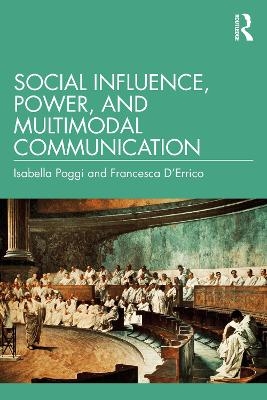
Social Influence, Power, and Multimodal Communication
Routledge (Verlag)
978-0-367-46527-8 (ISBN)
Social Influence, Power, and Multimodal Communication reveals how democratic leaders and dictators exploit multimodal communication to convince or seduce their audiences, using words, voice, gesture, face, gaze, and posture to boast about their merits or insult and ridicule rivals.
Poggi and D'Errico explore questions such as what is charisma, and how do we perceive it in a leader? And how do politicians display their dominance over opponents, or discredit them in TV debates and social media? Starting from a sociocognitive model of social interaction, observational studies reveal the rhetoric of words, hands, and faces, explaining how to see beyond their literal meanings, while experimental studies test their uses and persuasive effects. The authors affirm that multimodality helps others to influence us through displays of dominance, and by undermining our power through comments, insults, irony, ridicule, and parody. The devices of social influence and its multimodal management are illuminated, giving readers insight into how people influence others’ lives by using body language and verbal communication, either explicitly or in subtle but inexorable ways.
This fascinating text is a superb resource for students of psychology, communication, pragmatics, and political sciences, as well as for school teachers, politicians, spin doctors, active citizenship workers, and anyone seeking to understand how communicative power is managed, both in politics and everyday social contexts.
Isabella Poggi is full professor of Psychology of Emotions and Multimodal Communication at Roma Tre University. She works on emotions, multimodality, deception, music, and political communication. Francesca D’Errico is an associate professor of Social Psychology and Psychology of New Media and Advertising at the University of Bari Aldo Moro. She works on persuasive and emotional processes, and on the relationships between new media and ethical conduct.
Introduction 1. A Socio-Cognitive Model of Mind, Social Interaction, Emotion, and Communication 2. Social Influence and Persuasion 3. Persuasive Discourse 4. Persuasive Gesture, Persuasive Gaze 5. Dominance and its Signals 6. Charisma: The Gift of Influence 7. Benito Mussolini. Charisma in Words and Multimodal Communication of an Italian Dictator. 8. How to Increase One’s Power by Decreasing the Other’s. The Force of Discredit 9. Subtle Ways to Discredit in Debates. Comments by Words, Face, and Body 10. Attacking the Opponent’s Image. Insult as a Weapon for Political Discredit 11. A Laughter Will Bury You. Ridicule as a Discrediting Move 12. Irony and Ridicule in a Judicial Debate 13. Parody as a Political Weapon 14. Cognitive, Affective, and Persuasive Effects of Political Parody 15. Conclusion
| Erscheinungsdatum | 11.11.2022 |
|---|---|
| Zusatzinfo | 25 Tables, black and white; 39 Line drawings, black and white; 39 Illustrations, black and white |
| Verlagsort | London |
| Sprache | englisch |
| Maße | 156 x 234 mm |
| Gewicht | 535 g |
| Themenwelt | Geisteswissenschaften ► Psychologie ► Allgemeine Psychologie |
| Geisteswissenschaften ► Psychologie ► Sozialpsychologie | |
| Sozialwissenschaften ► Kommunikation / Medien ► Kommunikationswissenschaft | |
| ISBN-10 | 0-367-46527-2 / 0367465272 |
| ISBN-13 | 978-0-367-46527-8 / 9780367465278 |
| Zustand | Neuware |
| Informationen gemäß Produktsicherheitsverordnung (GPSR) | |
| Haben Sie eine Frage zum Produkt? |
aus dem Bereich


